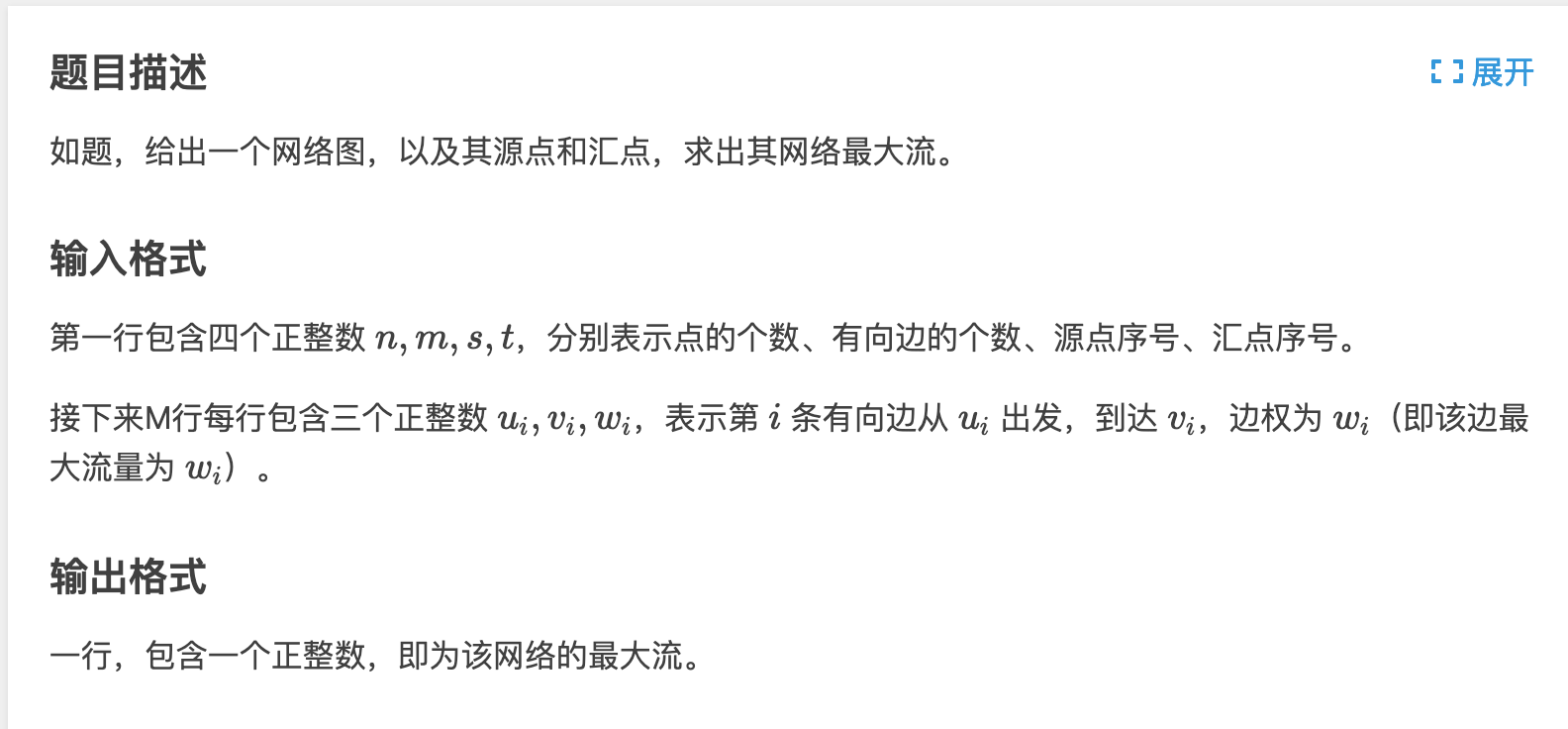
#include <iostream> #include <vector> #include <algorithm> #include <unordered_set> #include <cstring> #include <queue> # define LL long long using namespace std; const int INF=0x7fffffff; const int maxn=10000+10; const int maxm=100000+10; int N,M,S,T; int res; int head[maxn]; int en; struct Edge{ int to; int next; int c; }e[maxm<<1]; int visited[maxn]; int preedge[maxn]; int minflow[maxn]; void addEdge(int from, int to, int capa){ e[en].next=head[from]; e[en].to=to; e[en].c=capa; head[from]=en; ++en; } void add(int from, int to, int capa){ addEdge(from,to,capa); addEdge(to,from,0); } void bfs(){ memset(visited,0,sizeof(visited)); memset(preedge,-1,sizeof(preedge)); memset(minflow,0,sizeof(minflow)); memset(preedge,-1,sizeof(preedge)); minflow[S]=INF; visited[S]=1; queue<int> q; q.push(S); while(!q.empty()){ int cur=q.front(); q.pop(); for(int i=head[cur];i!=-1;i=e[i].next){ int v=e[i].to; if(visited[v]==1 || e[i].c<=0) continue; visited[v]=1; preedge[v]=i; q.push(v); minflow[v]=min(minflow[cur],e[i].c); } } } void EK(){ while(true){ bfs(); if(preedge[T]==-1) break; res+=minflow[T]; int v=T; while(true){ int edge=preedge[v]; int u=e[edge^1].to; e[edge].c-=minflow[T]; e[edge^1].c+=minflow[T]; if(u==S) break; v=u; } } } int main(){ memset(head,-1,sizeof(head)); scanf("%d %d %d %d", &N, &M, &S, &T); while(M--){ int u,v; int c; scanf("%d %d %d", &u, &v, &c); add(u,v,c); } EK(); printf("%d", res); return 0; }
用Dinic和long long获得满分:
#include <iostream> #include <vector> #include <algorithm> #include <unordered_set> #include <cstring> #include <queue> # define LL long long using namespace std; const LL INF = 2000000000000000; const int maxn = 10000 + 10; const int maxm = 100000 + 10; int N, M, S, T; int res; int head[maxn]; int curh[maxn]; int en; struct Edge { int to; int next; LL c; }e[maxm << 1]; int level[maxn]; int visited[maxn]; int preedge[maxn]; int minflow[maxn]; void addEdge(int from, int to, LL capa) { e[en].next = head[from]; e[en].to = to; e[en].c = capa; head[from] = en; ++en; } void add(int from, int to, LL capa) { addEdge(from, to, capa); addEdge(to, from, 0); } void bfs() { memset(level, -1, sizeof(level)); queue<int> q; q.push(S); level[S] = 0; while (!q.empty()) { int cur = q.front(); q.pop(); for (int i = head[cur]; i != -1; i = e[i].next) { int v = e[i].to; if (level[v]!=-1 || e[i].c <= 0) continue; level[v] = level[cur] + 1; q.push(v); } } } LL dfs(int u, LL minflow) { if (u == T) return minflow; for (int i = curh[u]; i != -1; i = e[i].next) { curh[u] = i; int v=e[i].to; if (level[u] + 1 != level[v] || e[i].c <= 0) continue; LL f = dfs(v, min(minflow, e[i].c)); if (f == 0) continue; e[i].c -= f; e[i ^ 1].c += f; return f; } return 0; } LL dinic() { LL res = 0; while (true) { bfs(); if (level[T] == -1) break; for (int i = 1; i <= N; i++) curh[i] = head[i]; while (true) { LL f = dfs(S, INF); if (f == 0) break; res += f; } } return res; } int main() { memset(head, -1, sizeof(head)); scanf("%d %d %d %d", &N, &M, &S, &T); while (M--) { int u, v; LL c; scanf("%d %d %lld", &u, &v, &c); add(u, v, c); } LL res=dinic(); printf("%lld", res); return 0; }